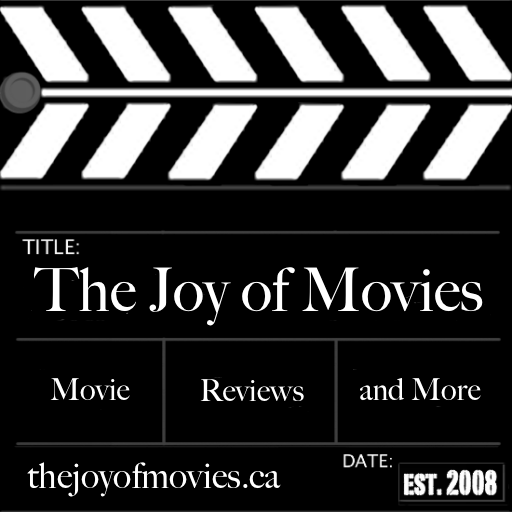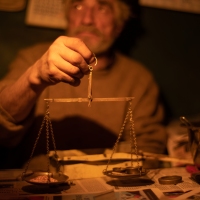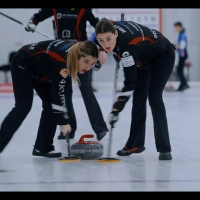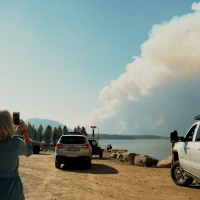Soundtrack Review: Rise of the Guardians
The song that opens the soundtrack, Still Dream, sung by Renée Fleming is not necessarily the sound you’d expect to play over the end credits before seeing the film, but it actually worked, and the lyrics are perfect for the film’s story. I’ve come to actually really love them. The melody as well is flowing and beautiful.
The rest of the 68 minute soundtrack features score tracks by Alexandre Desplat. Some appear to be a bit out of order at the beginning, but they work well this way. Opening with ‘Calling The Guardians’ which has inklings of all the character themes, provides a quicker track after the opening song to jumpstart us into the score tracks.
Next though, comes one of the tracks (‘Alone in the World’) that really stands out for me on the soundtrack. In it we are introduced to the quieter themes of Jack Frost’s backstory as well as his more playful side, and it is in these moments that I found Desplat’s score to really reach another level for me. Tracks 3, 5, and 9 are really his introductions to the story. What is interesting about Jack is that he really has several sides to him as presented through the music – his mischievous and playfulness, but also his confusion and longing to know of his past, and ultimately his gentler side as presented by the piano. In some ways, the song is very much his as well as the theme of the belief of childhood.
 Each character has this in a way – themes – such as track 6 (‘Dreamsand’) for Sandy. His has very quick and light notes – although the darkening of the sound, quickly turning heavier and minor in the latter half of this track is where Pitch is really introduced. Track 13 (‘Tooth Collection’) is also stylistically interesting. I like how each character’s ‘world’ was given a particular sound that still fits into the rest of the score.
Each character has this in a way – themes – such as track 6 (‘Dreamsand’) for Sandy. His has very quick and light notes – although the darkening of the sound, quickly turning heavier and minor in the latter half of this track is where Pitch is really introduced. Track 13 (‘Tooth Collection’) is also stylistically interesting. I like how each character’s ‘world’ was given a particular sound that still fits into the rest of the score.
This is a full orchestral score (performed by the London Symphony Orchestra), and uses a huge variety of instruments, with a fair amount of strings, horns, and interesting use of percussion. In some ways, I took note most often though when the score slowed and quieted down and piano took over the themes, such as in the middle of track 18. I find I often take note when piano takes over a string laden score – the tonal change begs me to stop and really listen to the same theme anew.
What I liked though is the instrumentations and variety of instruments used here. There is a certain dreamlike quality often captured, and the soundtrack is arranged in such a way that lighter tracks are paired with darker ones (a lot of this is the same order as the film as well). There are also a few briefer tracks on here, including tracks 4, 7, and 17 – all three at a minute or less. Each play a role in a particular point in the story and are nice inclusions here.
In some ways many of the earlier tracks (such as track 10) have a certain fast-paced busyness, the same as the movie had during its quick character introductions of the first act. This is a direct result of the scripting of the first act and the score matches up quite well with what’s on screen.
But as the score goes on, so do the development of the themes. Pitch’s introductions provides a darker sound that compliments the often light, even cartoonish scoring such as is present in track 11. Still, while it could be considered ‘Mickey Mousing’ the action on screen, a track like 12 (‘Nightmare’s Attack’) has to be admired by the extent that is going on.
In fact, I find this track to be quite interesting in its combinations of themes and the way it really touches on many elements of the entire film’s score (the track is 7 minutes long). It also uses quite a bit of ostinato and counterpoint, and definitely varying speeds and volume. The thing is with this film is that when you actually see it, you realize that the music in all of its (at times) crazy quick variations really does work with the often kinetic energy on screen. Surprisingly well in fact. I’d heard a bit of the score before seeing the film and I couldn’t quite picture it, but it works very nicely together.
Many tracks could be considered busy here when listened to outside of the film – a track like 15 (‘Jack & Sandman’) that really blends themes on top of each other for example. But they work with the kind of action on screen. One thing worth a note too, is that often Sandman’s action is very matched to the music, which I found serves this character – who communicates completely non-verbally – well.
Track 19 use percussion and ostinato very well and it is from here to the next few tracks that both the film and score take a more melancholy turn for the time being. I’d say both tracks 19 and 20 are some of the least lyrical and the most interesting with these mostly repeated themes and the percussion. And that leads us into track 21 (‘Jack’s Memories’), that plays over one of the most powerful points in the film, and it is here that Jack’s theme really is fully realized and towards the end of the track seamlessly blends into that of the Guardians.
From here on, we are solidly into act three. Sure, when you listen to a track like 22 it is clear that the same leitmotifs for the characters come through again and again, and it may be annoying for some, but I didn’t mind the classic feel it presented for me – something that seemed to be easy for me to accept over this animated fantasy-adventure story of good vs. evil. The film ends up with a very classic and timeless quality with its universal themes and I found the score to work with that even if it doesn’t sound like a lot of what is scored for animation nowadays. This kind of scoring walks a fine line and needs to be done right, but I found it was here. There is no doubt that this score is very centred on its themes. Tracks 25 and 26 make this very clear, taking almost all of the motifs, as well as the melody of the song, but I think this style of score was a completely intentional choice by the filmmakers.
Backtracking a sec, track 23 ‘Jamie Believes’ is another favourite of mine – again we have the piano in there, playing what I consider to be one of Jack’s many themes – a common thread through many of the tracks. As I wrote in my review of the film, this film is really his journey of discovery. But something else happens in this track – it is here that the piano plays the melody for the song Still Dream which in itself is a play on the themes.
Finally, closing out the soundtrack is the 27th track (‘Oath of the Guardians) which has a quiet, yet triumphant and childlike quality to it. It reminds me of the classic close outs to many adventure films of the past – and leads very well into the song (from the first track) that plays over the end credits.
Overall, Desplat’s score has a childlike sense of wonder and innocence throughout. It has quite a gentle sound at times with many quick, light notes, which contrast with the occasional darker sounds of Pitch, and the quieter emotional tracks for Jack’s backstory. I found it to be a very nice listen and to work quite well within the film. In some ways, for better or for worse, it is a very classic sounding score for an animated film. I personally really ended up taking to it. I’d say if you really enjoyed the film, you’ll probably be happy getting a copy of the soundtrack as well – I know I was.
___________________________________________________________________________
The CD for Rise of the Guardians was released by Varèse Sarabande on November 13th, 2012.
The soundtrack has 27 tracks and runs for 1 hour, 8 minutes, 31 seconds. The music for Rise of the Guardians was composed by Alexandre Desplat, and the song Still Dream was performed by Renée Fleming.
You can read our full theatrical reviews of the film here.











